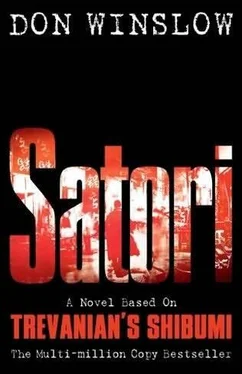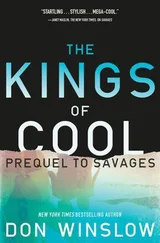“You think a lot of your value, Mr. Hel.”
“It is simply an objective evaluation.”
Yu stared at him. “If you reemerge anywhere in Indochina, the Americans will find you.”
“Just so.”
Yu agreed to consider his offer.
The Americans will find me, Nicholai thought when Yu left the room. No, we will find each other, and I will hold Haverford accountable for his treachery.
And then I will find Solange.
DIAMOND PORED over the Hel file.
God damn it, he thought. How could Hel have escaped the trap in the Beijing temple and that Chinese kung-fu son of a bitch who was supposed to have been so good? Yeah, so goddamn good that he let Hel put a bullet in his head and kill the rest of his men as well.
Two swings at Hel, he thought, two misses. First he dispatches the two would-be killers in Tokyo, then the massacre in Beijing.
Three strikes and you’re out, Diamond told himself.
The next try has to connect.
But you have to find Hel before you can kill him.
“Lure him,” Singleton had said.
Easy for the old fart to say, a little harder to do. Lure him with what? What bait can you set that would bring Hel in?
Diamond went back to studying the file that Singleton had forced Haverford to turn over. Start at the beginning, he told himself.
Start in Tokyo.
Find the bait that will bring that arrogant half-Jap bastard waltzing in.
NICHOLAI’S ROOM WAS pleasant.
Large, airy, made entirely of poles, it sat on stilts, the space below housing chickens and a pig. Nicholai learned that it sat on the edge of a remote Buddhist monastery in the hills of Wulian, high above the Lekang River, and that the nearby villagers were Puman people, an ethnic minority that spoke a Dai dialect but little Han Chinese. He could see the people through the window – the men wore black turbans, the women colorful headscarves with pieces of silver sewn into them.
It was all so different from drab Beijing.
As a further comfort, Yu had acquired all of Guibert’s clothing and personal effects and had them brought to Yunnan. Nicholai particularly appreciated the razor and small travel mirror, and one morning asked for a bowl of hot water so he could shave.
His image in the mirror was a bit of a shock. His skin was pale, his face drawn, the beard gave him the look of a prison camp survivor. Shaving made him look and feel better, but he realized that he would have to start eating regularly to regain his health.
“I want to get up,” he said.
The young monk who had brought the water looked nervous. “Xue Xin says not for five more days.”
“Is Xue Xin here at the moment?”
The young monk comically looked around the room. “No.”
“Then help me get up, please.”
“I will go ask -”
“If you go ask,” Nicholai said, “I will try to get up on my own while you are gone, and probably fall and die as a result. What would Xue Xin say to you then?”
“He would hit me with a stick.”
“So.”
The monk helped him out of the bed. Nicholai tentatively put some weight on the wounded leg. The pain was ferocious, and it started to buckle beneath him, but the monk steadied him and they walked across the room.
Then back again.
After three trips, Nicholai was exhausted and the monk helped him back into the bed.
The next morning he walked outside.
Painful and slow at first, his walk from the village to the monastery became part of a thrice-daily routine as he rebuilt his physical and mental stamina. Making his unsteady way along the narrow, stone-laid paths, he focused on details – unraveling individual birdsong from the cacophony of a score of species, identifying types of monkeys from their incessant chatter and warning screeches, distinguishing plants and vines from among thousands in the verdant forest.
The jungle was reclaiming the monastery.
Its vines cracked the old stones, swallowed columns and stiles, crept over flagstone pavilions like a patient, persistent tide of Go stones on a board. Yet statues of Buddha peeped through the vegetation, his eyes content with the knowledge that all things change and all physical matter inevitably decays.
The discipline of the walk was good for Nicholai’s mind, and every day the pain lessened and his strength returned until he could walk with strength and confidence. His spirit recovered as well, and soon he began to think about the future.
He almost tripped over the monk.
Xue Xin was on his hands and knees with a small blade, carefully trimming vines away from a stone path that led to a modest stupa. The monk wore a simple brown robe tied at the waist with a belt that had faded almost to white.
He looked up and asked, “Are you feeling better?”
“Yes. Thank you.”
Xue Xin slowly got to his feet and bowed. Nicholai bowed deeply in return.
“You don’t bow like a Frenchman,” Xue Xin said.
“I was raised in China,” Nicholai answered. “Later in Japan.”
Xue Xin laughed. “That explains it. The Japanese, they like to bow.”
“Yes, they do,” Nicholai agreed.
“Would you like to help?” Xue Xin asked.
“Forgive me,” Nicholai said, “but it seems an impossible task.”
“Not at all. Every day I clean each day’s growth away.”
“But it grows back,” Nicholai said. “Then you just have to do it again the next day.”
“Exactly.”
So Nicholai took to helping Xue Xin with the repetitive task of trying to keep the path clear. They met every morning and worked for hours, then stopped and took tea when the afternoon rain slashed down. Nicholai learned that Xue Xin was an honored guest at the monastery.
“They put up with me,” Xue Xin said. “I work. And you?”
“I don’t know if I am a guest here or a prisoner,” Nicholai answered truthfully, although he left it at that.
“As in life itself.” Xue Xin chuckled. “Are we its guest, or its prisoner?”
“As life dictates, I suppose.”
“Not at all,” Xue Xin answered.
“What do you mean?”
“It has stopped raining,” Xue Xin observed in response. They went back to work on the path.
The next day Xue Xin observed, “You attack the vines as if they are your enemy.”
“Are they not?”
“No, they are your allies,” Xue Xin answered. “Without them, you would not have a useful task to perform.”
“I would then have another useful task,” Nicholai answered, annoyed.
“With another set of ally-enemies,” Xue Xin said. “It is always the same, my Eastern-Western friend. But, by all means, if it makes you feel better, attack, attack.”
That night, lying in his kang , lonely and missing Solange, Nicholai had a crisis of the mind and soul. Raised as he was, he was familiar with basic Buddhist philosophy – only the unfamiliar would call it a religion, or the Buddha a god – that all suffering comes from attachment, that we are prisoners of our longings and desires that keep us bound to the endless cycle of life, death, and rebirth. He knew the Buddhist belief that these longings make us take negative actions – sins, if you must – that create and accumulate bad karma that must be ameliorated through the lifetimes, and that only enlightenment can free us from this trap.
He got up, took his flashlight, and made his way to Xue Xin’s cell. The monk was in full lotus position, meditating.
“You wish to trim vines by moonlight?” Xue Xin asked. “Very well, but do it without me, please.”
“I want my freedom.”
“Then trim vines.”
“That is glib,” Nicholai answered. “I expect more from you than Zen riddles.”
“You are suffering?”
Читать дальше












